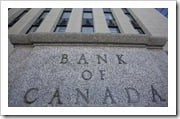 This week’s posted-rate cuts sparked a little confusion about how the benchmark qualifying rate rate will be affected.
This week’s posted-rate cuts sparked a little confusion about how the benchmark qualifying rate rate will be affected.
When RBC lowered its posted rate on Tuesday, some–us included–expected that to impact the benchmark rate (which is calculated on Wednesdays, and set the following Monday).
As it turns out, the benchmark rate won’t change until a week after this Monday. That prompted us to contact the Bank of Canada to see why.
Before we explain the process, however, here is some background.
Earlier this year the Department of Finance introduced the “benchmark rate” (aka, “qualifying rate“).
The benchmark rate is the rate lenders must now use to qualify mortgage borrowers for any high-ratio insured mortgage that does not have a fixed term of five years or more.
For applicants with less than 20% down, a higher qualifying rate typically means a lower maximum mortgage amount. In certain instances, the benchmark rate can be the difference between qualifying for the home you want, or not. It therefore helps to know how the benchmark qualifying rate is calculated.
Here’s how it works:
 Every Wednesday, the Bank of Canada records the posted 5-year fixed rates from each of the Big 6 banks.(For a rate change to impact a given week’s calculation, it must be announced before the calculation and have an effective date of that Wednesday or before. Rate changes that are announced Wednesday morning, but don’t take effect until Thursday, are ignored for that week.).
Every Wednesday, the Bank of Canada records the posted 5-year fixed rates from each of the Big 6 banks.(For a rate change to impact a given week’s calculation, it must be announced before the calculation and have an effective date of that Wednesday or before. Rate changes that are announced Wednesday morning, but don’t take effect until Thursday, are ignored for that week.).- A mode average is taken of the above six rates.(The “mode” is the value that occurs most frequently. Therefore, one bank’s rate change alone usually won’t affect the benchmark rate.)
- The BoC then updates that value on its website(It is data series number V80691335, which you can find here. This update is done at roughly 11:30am each Wednesday, give or take “an hour or so,” says Dale Alexander, a BoC spokesperson.)
- CMHC then uses this value to set the industry-wide benchmark qualifying rate. That is done at 12:01am (Eastern Time) every Monday.
This week for example, RBC announced its rate change on Tuesday August 3, effective Wednesday Aug 4.
All the other banks announced their changes on Wednesday Aug 4, effective Thursday Aug 5.
When the BoC calculated the benchmark rate on Wednesday, the mode of the big-6 banks’ 5-year rates was still 5.79%. That’s why the benchmark rate for this coming week is 5.79%, despite the fact that 5-year posted rates are now 5.59%.
Barring no further changes, the new 5.59% benchmark rate will take effect on Monday August 16.







hope all this calculation get us out of the recession soon!
Thats interesting. So, knowing that BOC would collect data on Wednesday the banks went a day late. Very interestine indeed. But the question is why is this downward trends? Lack of borrowers?
Long term bond yields are down, which mortgage rates are following (to a certain extent, that is).
The market does not forecast longterm bond/mortgage rates to go higher due to recent downward trending news….
I don’t know who is doing the research and background work on preparing this newsletter. You are to be commended both in your materials, and in your presentation of complex issues in a way that just about anyone can understand.
Kudos
Hi Don,
That’s really thoughtful of you to say. Sometimes we’re not sure if these kinds of pieces are too esoteric, so the feedback is much appreciated…and CMT is definitely a team effort all the way.
Cheers for now,
Rob